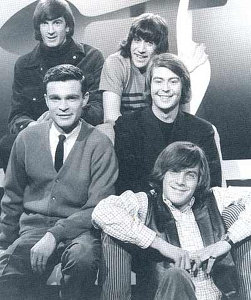| B i o g r a p h y |
 The Lovin'
Spoonful is an American pop rock band of the 1960s, named
to the Rock and Roll Hall of Fame in 2000. When asked about his band,
leader John Sebastian said it
sounded like a combination of "Mississippi John Hurt and Chuck Berry.
The Lovin'
Spoonful is an American pop rock band of the 1960s, named
to the Rock and Roll Hall of Fame in 2000. When asked about his band,
leader John Sebastian said it
sounded like a combination of "Mississippi John Hurt and Chuck Berry.
The band had its roots in the folk music scene based in the
Greenwich Village section of lower Manhattan during the early 1960s.
Sebastian, who grew up in contact with music and musicians, was the son
of a much-recorded and highly technically accomplished classical
harmonica player. He had reached maturity toward the end of the
American folk music revival that spanned from the 1950s to the early
'60s. Sebastian was joined in the Spoonful by guitarist Zal Yanovsky from a bohemian
folk group called The Mugwumps, playing local coffee houses and
small clubs (two other members, Cass
Elliot and Denny Doherty,
would later form half of the Mamas & the Papas.)
Drummer-vocalist Joe Butler and
bassist Steve Boone rounded
out the group. The group first recorded four tracks for Elektra Records
in early 1965, but elected to sign with Kama Sutra Records that same
year. The Elektra tracks were released on the 1966 various artists
compilation LP What's Shakin' after the band's success on Kama Sutra.
Working with producer Erik Jacobsen, the band released their first single, the Sebastian-penned "Do You Believe in Magic", in August of 1965. Unlike many pop groups of the day (the early Beatles being a notable and influential exception), The Lovin' Spoonful played all the instruments on their records, with the exceptions of the orchestral instruments heard on their soundtrack album You're A Big Boy Now and some later singles. Additionally, aside from a few covers (mostly on their first album) they wrote all their own material. "Do You Believe In Magic" became a Top Ten hit in the US, and the band followed it up with a series of hit singles and albums throughout 1965 and 1966, all produced by Jacobsen. The Lovin' Spoonful became known for such folk-flavored pop hits as "You Didn't Have to Be So Nice", and "Daydream", which went to #2 on the Billboard Hot 100." Arguably the most successful pop/rock group to have jug band roots, nearly half the songs on their first album were modernized versions of jug band standards. Their popularity revived interest in the form, and many subsequent jug bands cite them as an inspiration. The rest of their albums featured mostly original songs, but their jug band roots showed up again and again, particularly in their big hit "Daydream" and the lesser-known "Money", which featured a typewriter as percussion. They even had a crossover hit, as "Nashville Cats", a number eight pop hit, reached the country charts. Other hits were "Did You Ever Have to Make Up Your Mind" (another #2 hit) and "Younger Girl". Their only song to reach #1 on the Billboard Hot 100 chart was the harder-edged "Summer in the City", an indelible part of the soundtrack for the summer of 1966.
Early in their recording and airwave career, Lovin' Spoonful members
termed their approach "good-time music". In the liner notes of "Do You
Believe in Magic", Zal Yanovsky said he "became a convert to Reddy
Kilowatt because it's loud, and people dance to it, and it's loud".
Soon-to-be-members of the psychedelic rock band the Grateful Dead were
part of the West Coast acoustic folk music scene when The Lovin'
Spoonful came to town while on tour. They credited The Lovin' Spoonful
concert as a fateful experience, after which they decided to leave the
folk scene and "go electric." At the peak of its success the band was
originally selected to perform on the television show that became The
Monkees,[citation needed] and also gained an added bit of publicity
when Butler replaced Jim Rado in the role of Claude for a sold-out
four-month run with the Broadway production of the rock musical Hair.
The Lovin' Spoonful's song "Pow!" was used as the opening theme of
Woody Allen's first feature film, What's Up, Tiger Lily. John Sebastian
composed the music for Francis Ford Coppola's second film, You're a Big
Boy Now, and The Lovin' Spoonful played the music for the soundtrack,
which included yet another hit, "Darlin' Be Home Soon". Both films were
released in 1966.
The band's name was inspired by some lines in a song of Mississippi
John Hurt called the "Coffee Blues." John Sebastian credits Fritz
Richmond for suggesting the name.